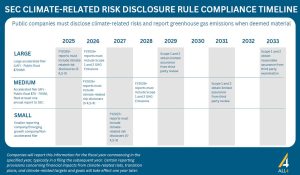The SEC’s Final Rule on Climate Disclosures
Posted: March 13th, 2024
Authors: James G. Daryl W.
On March 6th, the Securities and Exchange Commission (SEC) approved the highly anticipated final rule for The Enhancement and Standardization of Climate-Related Disclosures for Investors. This rule will become effective 60 days after it is published in the Federal Register which is still pending. The rule amendment is aimed at compelling companies to disclose information about their climate-related risks to investors. However, the final rule significantly deviates from the proposal released two years ago, featuring weaker provisions that grant companies the authority to determine the extent of information to be shared. In a notable shift, the final rule mandates climate-related disclosures only if deemed “financially material.” Under the original proposal, all public companies would have been obligated to calculate and report both Scope 1 direct greenhouse gas (GHG) emissions and Scope 2 indirect GHG emissions with no exceptions. In contrast, the final rule allows companies to report this information only if they consider it financially material. Approximately 40% of domestic public companies will be required to assess whether their emissions are material, exempting smaller companies and emerging growth businesses, generally those with less than $1.2 billion in annual revenues.
The final rule features several elements that significantly impact how companies approach climate-related disclosures in the United States (US). Below is a detailed breakdown of the final rule’s key takeaways:
- Companies registered as Accelerated Filers (AFs) and Large Accelerated Filers (LAFs) (non-exempt) are mandated and required to disclose their financially material Scope 1 and 2 GHG emissions.
- Scope 3 GHG emissions are no longer required for mandatory disclosures.
- The first disclosures will be required in Fiscal Year (FY) 2026 for FY 2025 data and compliance will be phased in based on the registrant type.
- Companies will be required to seek limited assurance for their disclosures starting within 3 years of the final rule, moving to reasonable assurance for LAFs within 7 years. Limited assurance represents the foundational level of assurance, where the independent auditor gathers ‘sufficient and appropriate evidence,’ restricting assurance to particular aspects of the sustainability report.
- The final rule did not adopt double materiality (impact materiality and financial materiality); The final rule will rely solely on the traditional US legal definition of financially material which is defined as “a substantial likelihood that a reasonable shareholder would consider it important in deciding how to vote or make other investment decisions”.
- Companies must disclose and be audited on the financially material impacts of severe weather events, carbon offsets, Renewable Energy Credits (RECs), and other climate-related factors where expenditures are greater than 1% of profits (before taxes including the disclosure of capitalized costs, expenditures, charges, and losses incurred.)
- Companies will be required to discuss identification, management, and oversight of climate-related risks, with the framework heavily based on Task Force on Climate-related Financial Disclosures (TCFD) principles.
- Board oversight descriptions will be required with the disclosure of material climate-related targets and goals.
- The final rule includes the requirement that companies must disclose climate-related risk assessment and management processes.
- There will be mandatory electronic tagging of climate-related disclosures in Inline XBRL, a structured data language that allows filers to prepare a single document that is both human-readable and machine-readable.
As highlighted, the framework from the TCFD served as the foundation of the climate-related disclosure final rule. Given that the TCFD framework is also a key influencer in shaping other major climate standards, such as the European Union (EU) and International Sustainability Standards Board (ISSB) standards, it becomes a convenient starting point for companies seeking a streamlined approach to navigate through the new requirements.
Since its publication in March 2022, the SEC’s proposal received unprecedented attention, with over 24,000 comment letters, making it the most commented-on proposed rule in SEC history. While the final rule aims to establish a more formal and consistent public reporting system, dissenting SEC Commissioners, including Commissioner Caroline Crenshaw, argued during the live meeting that the information presented to investors will be incomplete. Crenshaw characterized the final rule as adopting an unnecessarily limited version of disclosures, describing it as a “bare minimum” step forward. She expressed concerns about passing the responsibility to future commissions to ensure investors receive necessary information, stating, “Today’s rule is better for investors than no rule at all, and that’s why it has my vote. But while it has my vote, it does not have my unencumbered support.”
The final rule mandates that all required disclosures, except for material Scope 1 and Scope 2 climate emissions, must be included in the annual 10K filing, with the latter being disclosed in the second-quarter 10Q filing. This schedule will allow companies additional time for annual emissions data collection. Under this framework, companies are entrusted to determine the materiality of their emissions without obligation to share their analysis with investors. While the final rule lacks a specific test to determine the financial materiality of emissions, experts anticipate that the inclusion of a materiality test will not result in a total lack of emissions reporting, as failure to disclose may expose companies to SEC fines or investor lawsuits if the information is later deemed material.
The SEC’s final rule sets compliance dates depending on registrant type and disclosure content. The rule mandates the disclosure of vital climate-related information in registration statements and annual reports, responding to the recognition that such risks significantly impact a company’s risk and financial performance. Acknowledging the costs and disclosure burdens, the final rule adopts a phased-in approach with exemptions for smaller companies. Initial compliance falls on the largest corporations or filers, mandating them to gather information from FY 2025 for reporting in FY 2026. This phased introduction also extends to assurance requirements. See the timeline below for a look at the SEC’s climate final rule phased-approach based off the SEC’s climate final rule fact sheet:
While hailed as a positive stride for sustainable development, critics argue that this final rule may be insufficient, lacking comprehensiveness. Nevertheless, it signifies progress in achieving consistent, comparable, and reliable climate-related information disclosure, attempting to meet the escalating demand for transparency on climate risks and management from investors. A notable drawback is the exclusion of Scope 3 GHG emissions, representing indirect emissions beyond a company’s control but within its value chain. John Tobin, a professor at Cornell University and former managing director of sustainability at Credit Suisse, emphasized the rule’s shortcoming in lacking requirements for disclosing certain Scope 3 emissions, particularly upstream supply chain emissions, which could pose significant risks to a company’s business. Critics argue that this misses the purpose of climate disclosures, which is to provide investors with information regarding a company’s exposure to climate-related risks, climate policy changes, energy prices, and shifts in consumer sentiments.
Despite criticisms, tying required disclosures to a materiality test may serve as a legal safeguard for the rule when it inevitably faces legal challenges. Many groups, including the National Association of Manufacturers (NAM), have threatened to sue the Commission if it exceeds its legal authority. A total of 13 Republican-led states and two energy companies have already filed lawsuits against the new rule, just days after the final vote.
In addition to the SEC, there are currently several regulatory authorities that have adopted ESG reporting disclosures for the companies that operate and/or do business within their jurisdictions. With the addition of the SEC’s final rule, the following chart summarizes the current regions that have adopted ESG reporting as law.
Summary Chart of ESG Reporting Disclosure Requirements in Various Regions |
||
| Region | Reporting Requirements | Regulatory Authority |
| ASEAN | Mandatory and ‘comply or explain’ basis reporting for publicly listed companies in countries including Indonesia, Malaysia, Philippines, Singapore, Thailand, and Vietnam. | Detailed jurisdiction-specific requirements in GRI’s 2022 report. |
| Chile | Annual reports must disclose ESG information based on SASB and GRI, material climate-related risks (TCFD), and sector-specific SASB sustainability information. | Financial Markets Commission |
| China | Listed companies with high environmental impact must disclose various environmental information. | Ministry of Ecology and Environment (MEE) |
| Egypt | ESG issues disclosure in annual reports for financial institutions (excluding banks) and listed companies. | Financial Regulatory Authority |
| European Union (EU) | Corporate Sustainability Reporting Directive (CSRD) requires detailed reporting on ESG matters like climate change, environmental impact, social responsibility, human rights, and anti-corruption. | European Commission |
| Hong Kong | Mandatory and ‘comply or explain’ ESG reporting requirements for listed companies. | Hong Kong Stock Exchange (HKEX) |
| India | Top 1,000 companies by market cap must disclose material business conduct and sustainability issues, including climate risks. |
Securities and Exchange Board of India (SEBI) |
| New Zealand | Large publicly listed companies, insurers, banks, non-bank deposit takers, and investment managers must make climate-related disclosures. | Ministry for the Environment |
| United Kingdom (UK) | Mandatory climate-related risk disclosure for the largest listed businesses. | Financial Conduct Authority (FCA) |
| United States (SEC) | Climate final rule mandates climate-related disclosures if deemed “material,” impacting approximately 40% of domestic public companies. | Securities and Exchange Commission (SEC) |
| United States (California) | Two state senate bills and one state assembly bill that collectively require certain public and private U.S. companies that perform certain business activities in California to provide disclosures about their GHG emissions
|
California Legislative |
The phase-in periods outlined in the SEC’s final rule should provide ample time for companies to adequately prepare for their reporting requirements. It’s worth noting that many of the more prescriptive and challenging elements proposed, such as Scope 3 GHG emissions and most financial statement requirements, are absent from the final rule. It’s crucial for companies to conduct a preliminary materiality determination to guide their disclosure and compliance preparation, including organizing their GHG emissions data and conducting a gap assessment to compare current voluntary disclosures with anticipated mandatory requirements. Additionally, companies should evaluate the need for additional governance, policies, controls, procedures, and digital software solutions to support reporting and data organization while also considering global climate disclosure requirements. Moreover, companies should develop a compliance plan based on their materiality determination, gap assessment, applicable phase-ins, and other climate disclosure requirements. The phased-in approach of the SEC’s final rule emphasizes the importance of providing investors with consistent, comparable, and reliable information, enabling companies to adjust based on their filing status. While the new rule represents progress towards comprehensive and standardized climate-related risk information, concerns remain about its effectiveness in meeting investor needs and addressing reporting gaps. The final rule reflects a delicate compromise between transparency demands and corporate autonomy.
ALL4 can provide support in materiality assessments, GHG accounting procedures, ESG reporting strategy, assurance services, setting carbon reduction targets, pursuing net-zero goals, and implementing climate initiatives. As companies navigate this evolving landscape, assistance from organizations like ALL4 becomes crucial in navigating materiality assessments, developing GHG accounting procedures, addressing ESG reporting strategy, and establishing assurance services, as well as setting carbon reduction targets and net-zero goals, and climate initiatives.
For inquiries, contact ALL4’s Sustainability experts at:
- Daryl Whitt, Technical Director of Climate Change & Sustainability, at dwhitt@all4inc.com
- James Giannantonio, Managing Consultant of ESG & Sustainability, at jgiannantonio@all4inc.com
- https://www.pbs.org/newshour/economy/sec-approves-rule-that-requires-some-companies-to-publicly-report-emissions-and-climate-risks
- https://www.sec.gov/news/statement/munter-statement-assessing-materiality-030922
- https://finance.yahoo.com/news/one-big-change-sec-climate-094602446.html?guccounter=1&guce_referrer=aHR0cHM6Ly93d3cuZ29vZ2xlLmNvbS8&guce_referrer_sig=AQAAAEorEcQy-YEvsfLQPI9hop4K_cAvDqPmD08e4b9G9NxC4NctpgFQQeOSqjo633Mk-92VtSRokrbLTNWb-YUJGI5n8I9o5KGtAgQo1GxQKUIUW3pkzJMnUtLLQ671skx_HIZyZJzlU2X0mKKTLbfy0DpBL-F4ihtRmUQI9ZA9z4Qu
- https://www.globalreporting.org/media/oujbt3ed/climate-reporting-in-asean-state-of-corporate-practices-2022.pdf
- https://www.investmentnews.com/regulation-and-legislation/news/sec-passes-climate-rule-that-leaves-no-one-happy-250403
- https://heatmap.news/economy/sec-climate-disclosure-change
- https://nam.org/manufacturers-sue-sec-on-proxy-rule-rescission-18335/
- https://csrc.nist.gov/glossary/term/materiality#:~:text=Northway%2C%20426%20U.S.%20438%2C%20449,total%20mix’%20of%20information%20made
- https://www.sustain.life/blog/limited-assurance-vs-reasonable-assurance


